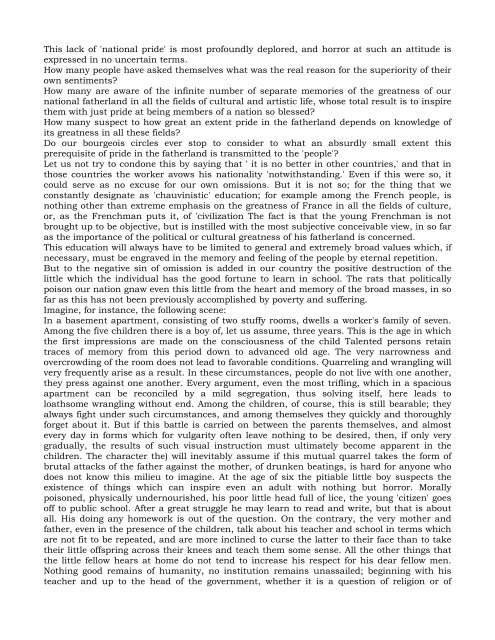Mein Kampf by Adolf Hitler
Mein Kampf by Adolf Hitler
Mein Kampf by Adolf Hitler
- TAGS
- kampf
- adolf
- hitler
- stuff2share.com
Create successful ePaper yourself
Turn your PDF publications into a flip-book with our unique Google optimized e-Paper software.
This lack of 'national pride' is most profoundly deplored, and horror at such an attitude is<br />
expressed in no uncertain terms.<br />
How many people have asked themselves what was the real reason for the superiority of their<br />
own sentiments?<br />
How many are aware of the infinite number of separate memories of the greatness of our<br />
national fatherland in all the fields of cultural and artistic life, whose total result is to inspire<br />
them with just pride at being members of a nation so blessed?<br />
How many suspect to how great an extent pride in the fatherland depends on knowledge of<br />
its greatness in all these fields?<br />
Do our bourgeois circles ever stop to consider to what an absurdly small extent this<br />
prerequisite of pride in the fatherland is transmitted to the 'people'?<br />
Let us not try to condone this <strong>by</strong> saying that ' it is no better in other countries,' and that in<br />
those countries the worker avows his nationality 'notwithstanding.' Even if this were so, it<br />
could serve as no excuse for our own omissions. But it is not so; for the thing that we<br />
constantly designate as 'chauvinistic' education; for example among the French people, is<br />
nothing other than extreme emphasis on the greatness of France in all the fields of culture,<br />
or, as the Frenchman puts it, of 'civilization The fact is that the young Frenchman is not<br />
brought up to be objective, but is instilled with the most subjective conceivable view, in so far<br />
as the importance of the political or cultural greatness of his fatherland is concerned.<br />
This education will always have to be limited to general and extremely broad values which, if<br />
necessary, must be engraved in the memory and feeling of the people <strong>by</strong> eternal repetition.<br />
But to the negative sin of omission is added in our country the positive destruction of the<br />
little which the individual has the good fortune to learn in school. The rats that politically<br />
poison our nation gnaw even this little from the heart and memory of the broad masses, in so<br />
far as this has not been previously accomplished <strong>by</strong> poverty and suffering.<br />
Imagine, for instance, the following scene:<br />
In a basement apartment, consisting of two stuffy rooms, dwells a worker's family of seven.<br />
Among the five children there is a boy of, let us assume, three years. This is the age in which<br />
the first impressions are made on the consciousness of the child Talented persons retain<br />
traces of memory from this period down to advanced old age. The very narrowness and<br />
overcrowding of the room does not lead to favorable conditions. Quarreling and wrangling will<br />
very frequently arise as a result. In these circumstances, people do not live with one another,<br />
they press against one another. Every argument, even the most trifling, which in a spacious<br />
apartment can be reconciled <strong>by</strong> a mild segregation, thus solving itself, here leads to<br />
loathsome wrangling without end. Among the children, of course, this is still bearable; they<br />
always fight under such circumstances, and among themselves they quickly and thoroughly<br />
forget about it. But if this battle is carried on between the parents themselves, and almost<br />
every day in forms which for vulgarity often leave nothing to be desired, then, if only very<br />
gradually, the results of such visual instruction must ultimately become apparent in the<br />
children. The character the) will inevitably assume if this mutual quarrel takes the form of<br />
brutal attacks of the father against the mother, of drunken beatings, is hard for anyone who<br />
does not know this milieu to imagine. At the age of six the pitiable little boy suspects the<br />
existence of things which can inspire even an adult with nothing but horror. Morally<br />
poisoned, physically undernourished, his poor little head full of lice, the young 'citizen' goes<br />
off to public school. After a great struggle he may learn to read and write, but that is about<br />
all. His doing any homework is out of the question. On the contrary, the very mother and<br />
father, even in the presence of the children, talk about his teacher and school in terms which<br />
are not fit to be repeated, and are more inclined to curse the latter to their face than to take<br />
their little offspring across their knees and teach them some sense. All the other things that<br />
the little fellow hears at home do not tend to increase his respect for his dear fellow men.<br />
Nothing good remains of humanity, no institution remains unassailed; beginning with his<br />
teacher and up to the head of the government, whether it is a question of religion or of


